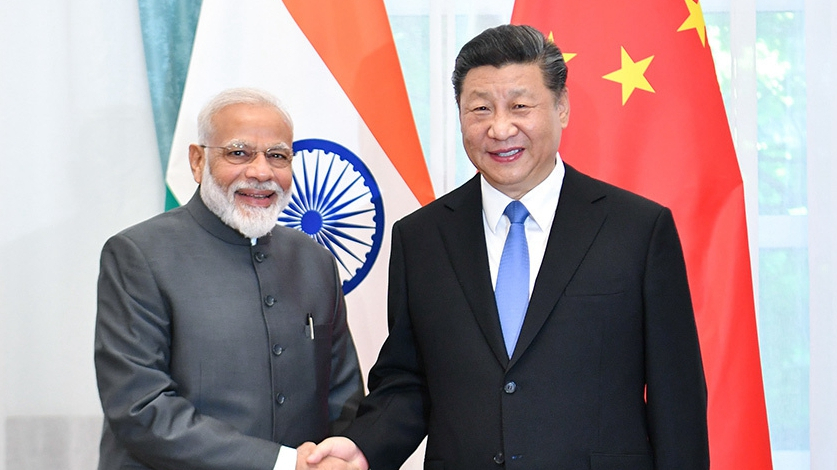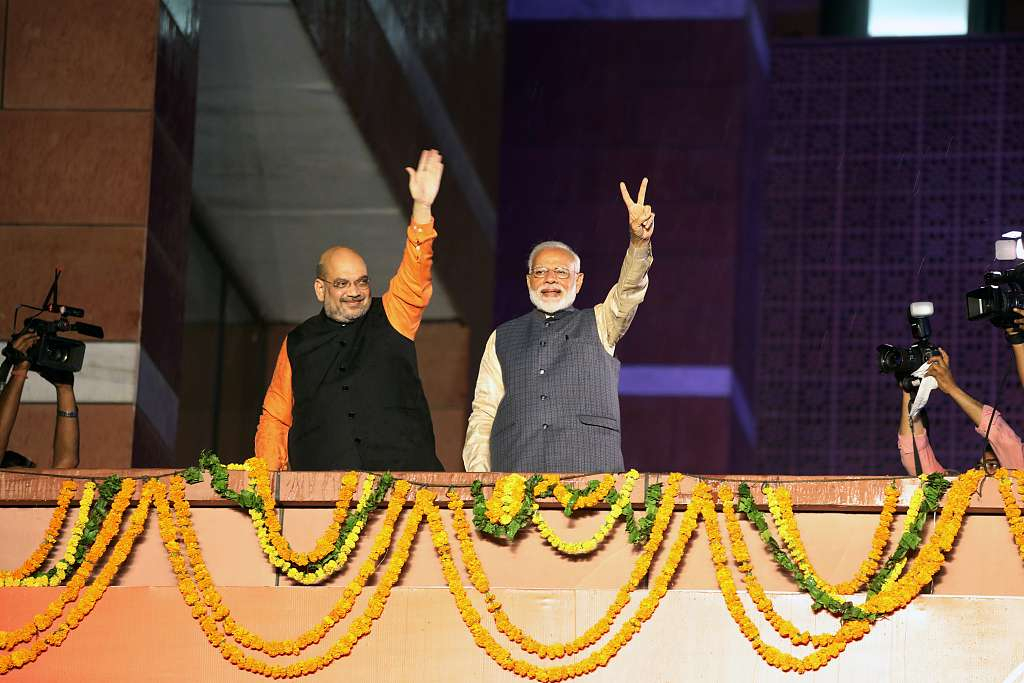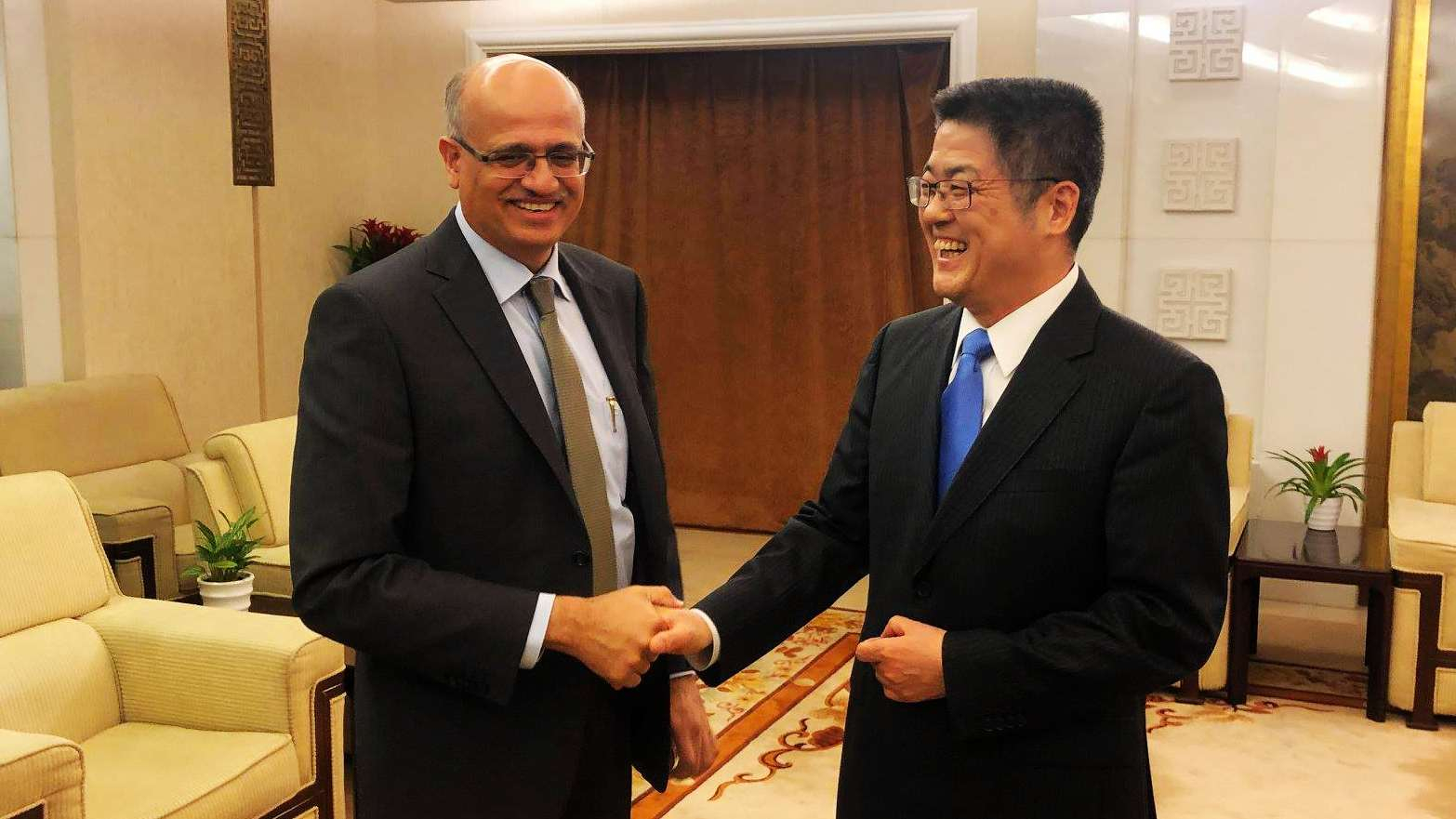

Editor's Note: Ning Shengnan is an assistant research fellow at the Department for Developing Countries Studies, China Institute of International Studies. The article reflects the author's opinion, and not necessarily the views of CGTN.
With the 19th meeting of the Council of Heads of State of the Shanghai Cooperation Organization (SCO) being held in Bishkek, Chinese President Xi Jinping and Indian Prime Minister Narendra Modi held a meeting on the sidelines of the SCO summit on June 13. This is the first direct interaction between the two leaders after Modi’s re-election in May.
As Indian Prime Minister Modi tweeted, he “had an extremely fruitful meeting with President Xi Jinping.” Both sides recognized the positive role of strategic communication in deepening their partnership and decided to continue working together to improve the economic and cultural ties. President Xi also extended his congratulation to Prime Minister Modi for winning the general election.
During the past days, Sino-Indian relations have witnessed many cheerful changes: President Xi and Prime Minister Modi have met as many as four times within 2018, including the groundbreaking Wuhan summit that laid the sound foundation of strategic consensus.
Bilateral trade has escalated to a historic high of 95.54 billion U.S. dollars in 2018, and constructive outcomes have been achieved at the 21st round of China-India border talks. Plus, there is the China-India high-level people-to-people exchanges mechanism leading public communications.

Bhartiya Janata Party (BJP) President Amit Shah (L) and Indian Prime Minister Narendra Modi gesture to the crowd during an event at the party's headquarters in New Delhi, India, May 23, 2019. /VCG Photo
Furthermore, China has recently lifted its technical hold against a proposal to add Jaish-e-Mohammad chief Masood Azhar to the ISIL and Al-Qaida Sanctions List. The proper settlement of this issue is greatly welcomed by India. With the two giants set to celebrate 70 years of diplomatic ties next year, people have ample reasons to believe that this meeting on the SCO summit would bring about more positive outcomes.
Regionally, the economic volume of China and India constitutes major economic momentum for the SCO, which is often seen as an organization about security. Critics often point to the organization’s lack of economic cooperation. Now with the world’s two emerging economies joining hands, there will be more opportunities for the member states to advance trade and investment cooperation, and the regional economic integration would be deepened as well.
For instance, both China and India endeavor to connect with Central Asian countries. With these two countries’ grand initiatives of building infrastructure, their huge demand for energy, and the more vibrant economic and people-to-people exchanges, Central Asia countries would harvest significant development welfare.
On the global stage, India and China have more similarities than differences. They are the two most populous countries in the world, with both of their population exceeding 1.3 billion. Both governments are working hard to create more jobs, support education and health care for the public, and lead their people out of poverty. The two economies are growing faster than most countries in the world, and together they make up more than 20 percent of the global GDP.

India's Foreign Secretary Vijay Gokhale (L) during his meeting with China's Vice Foreign Minister Le Yucheng in Beijing, China, April 22, 2019. /Photo via Indian Embassy in Beijing
The two countries are on the same road of globalization. Both of them are latecomers to the globalization trend. China started earlier, but the logic is the same: becoming integrated into the global economic network and to make best use of comparative advantages. This is the right way to stimulate economic growth and improve the people’s welfare. This also explains why China is deepening its structural reform, and why India is making efforts to improve its domestic investment environment and to forge itself into a new global manufacturing hub.
Unfortunately, the present atmosphere is not so good for the development of the two countries. Trade protectionism and unilateralism are very much on the rise. U.S. President Donald Trump has constantly accused countries like China and India of trade manipulation and “taking advantage of the U.S.” After waging a “trade war” against China, the U.S. has recently removed India from the Generalized System of Preferences that used to exempt some Indian goods from import duties. India is “Tariff King,” said President Donald Trump when describing India “imposing tremendously high tariffs” on American products.
How to respond to these bullying practices of the U.S. is the common challenge faced not only by China but also by India. More importantly, with President Trump willfully “punishing” other countries for gaining trade surplus with the U.S., and threatening to withdraw from WTO, the traditional free trade order is actually being sabotaged.
For countries like India and China, the most severe consequence does not lie in the specific loss, but in the escalating uncertainty. And this uncertainty is extremely detrimental to their development. Once the existing international order falls apart, China and India would be forced to pay far more resources to adapt themselves again to the world system, which may be more hostile against emerging economies based on the behaviors of President Trump. In this sense, it is necessary for China and India to act together against the trade protectionism and unilateralism. And this is one of the most important messages of this meeting in Bishkek.
(If you want to contribute and have specific expertise, please contact us at opinions@cgtn.com.)

Copyright © 2018 CGTN. Beijing ICP prepared NO.16065310-3
Copyright © 2018 CGTN. Beijing ICP prepared NO.16065310-3